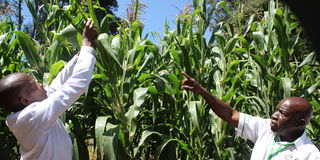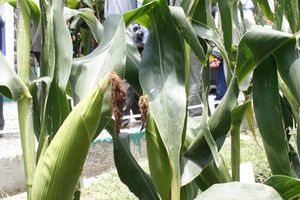New technology to cut costs for maize farmers

Dr Masinde Wanyama, the Kalro Kitale Food Crops Institute director, (left) explains how the technology works.
What you need to know:
- Three hybrids — one early maturing variety (CHKE21W001) and two medium maturing varieties (CHKM21W002 and CHKM21W003) — have already been recommended for release by Kenya Plant Health Inspectorate Service (Kephis).
- Two hybrids – (CHKM21W001 and CKDHH15008FNP) — are in the second year of testing in National Performance Trials and are likely to be released later this year.
- These hybrids demonstrated excellent emergence, good nitrogen use efficiency, high yields of 25-30 bags per acre and yield stability in the early and medium altitude agro ecological zones, he noted.
For many years, farmers have grappled with rising costs of hybrid maize seeds. However, they can now access cheaper hybrid maize seeds, thanks to a new technology developed by the Kenya Agriculture Research and Livestock Organisation (Kalro).
The technology dubbed ‘Seed Production Technology for Africa’ (SPTA) eliminates the need for detasseling manually, a highly intensive and time-consuming process that accounts for 40 to 60 per cent increase in cost of hybrid maize seeds.
The technology also guarantees farmers improved yields.
Detasseling is the process of manually removing the tassel (pollen-producing flowers) from the top of the maize plant to prevent it from pollinating itself.
Maize hybrid seed producers have been preventing self-fertilisation through manual detasseling, ending up transferring the cost to farmers.
According to Dr Masinde Wanyama, the principal lead researcher, the technology utilises a dominant non-pollen producing maize gene, Ms44, to produce female parent plants that are unable to produce pollen; hence need not to be detasseled during hybrid seed production process.
“With the gene, the tassel of the female plant will not be able to produce pollen. This means that the silk of the female plants will only be fertilised with pollen from desired male plant variety,” states Dr Wanyama.
He adds that the technology will be presented to local seed companies on a royalty-free basis.
“That means labour costs of detassiling are saved for the benefit of the farmer. Generally, the cost of producing will reduce by 40 to 60 per cent depending on the maize variety,” he notes.
Karlo Director General Eliud Kireger explained that through collaborative research undertaken by the organisation and its partners, the project has developed five hybrids. Three hybrids, one early maturing variety (CHKE21W001) and two medium maturing varieties (CHKM21W002 and CHKM21W003) have already been recommended for release by Kenya Plant Health Inspectorate Service (Kephis).
Two hybrids - (CHKM21W001 and CKDHH15008FNP) - are in the second year of testing in National Performance Trials and are likely to be released later this year. These hybrids demonstrated excellent emergence, good nitrogen use efficiency, high yields of 25-30 bags per acre and yield stability in the early and medium altitude agro ecological zones, he noted.
“This technology will help small and medium seed producing companies to produce high quality hybrid maize more efficiently at a reduced cost since detasseling requires six people per hectare to work daily for about three weeks. This means costs of up to about Sh58,800 per ha will be saved. In addition, farmers will be assured of high-quality seeds and higher yields,” stated Dr Kireger.
The Kalro boss noted that the new varieties have recorded five per cent more yields compared to the pollen producing varieties under low soil fertility conditions.
SPTA hybrids also had excellent standability, good plant aspects and closed husk cover, among other attributes.
“Commercialisation of these varieties will ensure availability, access and use of quality seeds to the farmers. One of the main objectives of Kalro Seeds is to ensure access to quality seed to farmers where SPTA hybrids are envisaged to play a major role in seed production in Kenya. Karlo seeds and other stakeholders in the seed industry have a good opportunity to produce high quality seeds at a reduced cost, attracting favourable market prices to the farmers,” explained Dr Kireger.
Dr Wanyama stated that research on the validation of the technology was undertaken from 2016 to 2020 at Karlo Kitale, Kalro Embu and Kalro Kakamega. Farm trials have been done in Kakamega, Bungoma, Busia, Embua and Kirinyanga.
Dr Kireger said that with the recent launch of KALRO Mkulima shops across the country, Karlo Seeds will have guaranteed access to quality and superior seed varieties and other technologies to seed growers, seed managers and experts to ensure quality seed production.
Currently Karlo Seed has 15 centres actively involved in seed production of various improved varieties of which three centers have excellent production conditions to produce SPTA hybrids.
These are AMRI Katumani to produce early maturing variety, NRI Kakamega and FCRC Embu to produce medium maturing varieties and FCRI Kitale for production of late maturing varieties.
The SPTA on-farm trials conducted in these locations such as the dryland transition (Katumani), medium altitude (Embu) and medium altitude transition (Kakamega) agro-ecological zones showed that SPTA hybrids produce higher yields compared to the older hybrids currently in the market.
KALRO expects to be in the forefront in the production of hybrids that are climate-smart, high quality and with reduced production and retail prices to benefit more farmers in the target regions.





